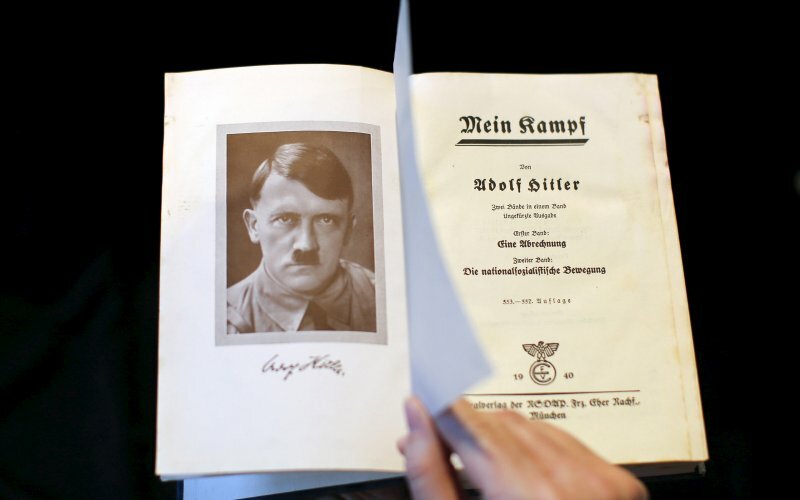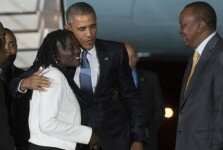Fabrizio Bensch/Reuters
MUNICH — Who hasn’t heard of Mein Kampf, Adolf Hitler’s infamous Nazi screed? The book laid the foundation for his Nazi ideology and the roadmap to the Third Reich. Mein Kampf (My Struggle) was Hitler’s preamble to war; it’s where he preached what he would later practice.
But few alive today have actually read it, especially in its original language. Because in Germany, Hitler’s book was banned from the end of the Second World War until January 1 this year. Now Germany’s Institute of Contemporary History is republishing it, and while this scholarly version is the first edition to go back on sale in modern Germany, it may not be the last.
But will it sell? Market forces may have a part to play in this, and right now the market is, to say the least uncertain.
“Nobody read Mein Kampf when Hitler was in power.” says Niklas Frank, and he should know. His father was Hans Frank, confidante of Hitler and the high profile Nazi Governor of Poland, responsible for the death of millions.
As the child of a major war criminal, Niklas Frank has few good words for Hitler’s Nazi manifesto. “When you were married you got a copy of this bloody book, but nobody, really, was interested in it.”
The new German edition of Mein Kampf is hitting the stores just now, 90 years after the first printing in 1926. The Munich-based Institute of Contemporary History has pulled together an annotated version of Hitler’s megalomanic diatribe, adding no less than 1200 pages to the already very bulky 800-page read. If the original was boring, this one may be very heavy going indeed.
That this new edition, like the first one, is printed in Munich, is no coincidence. The German state of Bavaria, of which Munich is the capital, has held the copyright to Hitler’s book ever since the war ended.
Munich, you’ll recall, is the place where Nazism was born and flourished. In this city, young Austrian-born Adolph Schicklgruber settled in 1913 when he was 24, and recast himself with the punchier surname of Hitler. After their foiled 1923 coup, the so-called Bierstube (beer hall) Putsch, the Nazis proclaimed Munich the “capital of the movement.” Because Hitler only left Munich to take his parliamentary seat in Berlin as Chancellor in 1933, his official residency remained here. That is how Bavaria managed to get the rights to the book and prevent any German copies from being published until January the 1st of 2016. Copyright in Germany expires after 70 years.
Niklas Frank told The Daily Beast he first read Mein Kampf when he picked up a German-language copy as a journalist in Namibia, many years ago. “There you can buy it in every bookshop,” he said.
As for this reprint, he sees no danger in it. “Brilliant idea, it should have been done years ago. A big part of Mein Kampf is boring, sometimes it’s even a little funny,” Frank sniggers. “When he [Hitler] describes how he started the National Socialist party for instance. As the name of the book suggests, ‘my struggle,’ he is always pretending to do or fulfill something or other.”
Munich is wealthy and beautiful and many of its people today fit that description. Men are attired in smart casual wear and women dress in coats with fur trimmings. They slowly parade the quaint little squares and shiny boulevards that make up the center of town. It looks like a classic children’s picture book; nothing is out of place. In the shop windows dirndl dresses and lederhosen are sold next door to specialized stores selling only tea or herbs. The Bavarian capital has always been affluent, even between the two world wars.
It’s always crowded at the local Bierstube Hofbrauhaus, a place where tourists can mingle with locals and taste the regional beers. The brass band plays traditional folkloric music in its domed basement as people sit down at its long tables.
Before the war, the Munich Bierstube was the place where Nazis held their meetings. Hitler himself passed by.
But on the eve of the Mein Kampf republication, Buck, Preston, Kevin and Lena are at a table here near the brass band. The trumpet player is a member of their own band, in fact. The group meets here twice a year. Buck: “My grandfather was fighting as a GI and Kevin’s grandfather was in the SS, they were mortal enemies, and here we are!”
The personal stories of this gathering give the impression everyone’s family here is linked somehow to the war. Most of them grew up in Munich, or around it. Buck is from Dachau. “So every time someone looks at my passport they react. But because I’ve got dark skin nobody bothers me about it.”
Buck and Preston’s family histories are entwined with the war, because their grandfathers were American GI’s. Preston’s grandfather married a German girl and only separated years after.
Preston: “My grandfather married a German girl, I was born in the US but raised as a true German, so I get a perspective from both sides, that’s great.” Buck still wants to look for his American relatives at some point. His father never met his grandfather, the GI Frank Wootz, who impregnated his grandmother then went back to the family he had already in the States.
At the press conference launching the book, Mein Kampf’s new edition was introduced by Dr. Andreas Wirsching, director of the Institute of Contemporary History. “It would be irresponsible to let this convoluted version of inhumanity roam free without critical reference,” he said, explaining the purpose of the voluminous annotations. By “contextualizing and deconstructing” the original work, the Institute hopes to inoculate its readers against Nazism. “We published the book ourselves, without commercial intentions,” said Wirsching. “The purpose is to add to the demystification, to present the deadly racism in a critical way.”






